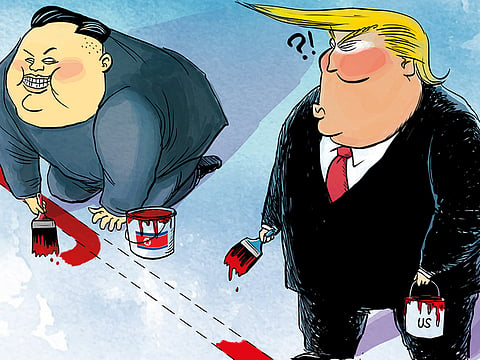Trump must watch his step on North Korea
Washington should cut the happy talk and maintain a high degree of scepticism about Pyongyang’s intentions

United States President Donald Trump is desperate for a big win in foreign policy after a series of less-than-successful stunts. Moving the US Embassy to occupied Jerusalem touched off mass protests in which approximately 60 Palestinians were killed. His concession to China on ZTE led to bipartisan scorn. In short, he has put all his eggs in the North Korea basket.
On Tuesday, North Korean leader Kim Jong-un, taking in Trump’s concession on ZTE, no doubt saw how easily Trump can be manipulated in search of a win. Kim swiftly demonstrated how Trump’s expectations can be dashed — and how vulnerable the neophyte president is to getting played by Pyongyang.
The latest warning, delivered by former North Korean nuclear negotiator Kim Gye-gwan, fits Pyongyang’s well-established pattern of raising the stakes in negotiations by threatening to walk out if it doesn’t get its way. The Brookings Institution’s Michael O’Hanlon observes that a “no more Mr Nice Guy” stance actually is “more reassuring than the love fests that were happening previously, because they seemed surreal”. There are a couple of ways to read this shift in tone. Either Kim is now nervous about the whole detente process, given the clear US goals, and wants to shut it down entirely, in which case the summit may not happen at all. Or, more likely, he is beginning the bargaining process in earnest, since the Trump administration was misinterpreting what he really meant and really was offering with all his talk of peace and denuclearisation. It’s not going to be that easy, or unilateral on his part, and most of us didn’t think it would be.
If it is the latter, Trump may be particularly susceptible to Pyongyang’s posturing. Trump’s reliance on “chemistry” with world leaders and penchant for interpreting other countries’ moves — be it the “nice” release of three Americans held in North Korea or a red-carpet welcome in China — in personal terms are counterproductive when dealing with a methodical, aggressive regime. Pyongyang also cleverly targeted US National Security Adviser John Bolton, whose touting of the “Libya model” (in which its leader was deposed and then killed in rebel custody) was needlessly provocative. Though North Korea has been for the most part silent about its intentions for the meeting, the announcements underscore two of its biggest concerns — the future of the nearly 30,000 US troops in South Korea and claims coming out of Washington lately that sanctions and Trump’s ‘maximum pressure’ policy are what drove Kim to the negotiating table.
But defanging Bolton, the most militant of Trump’s advisers, is now also apparently a major priority.
“We do not hide our feeling of repugnance towards him,” North Korea said of Bolton in a statement attributed by state-run media to senior Foreign Ministry official Kim Kye-gwan. It warned of a “ridiculous comedy” if Trump listens to Bolton and “quasi-patriots” who insist on “abandoning nuclear weapons first, compensating afterward”. “We have already stated our intention for denuclearisation of the Korean Peninsula and made clear on several occasions that precondition for denuclearisation is to put an end to anti-DPRK hostile policy and nuclear threats and blackmail of the United States ... But now, the US is miscalculating the magnanimity and broad-minded initiatives of the DPRK as signs of weakness and trying to embellish and advertise as if these are the product of its sanctions and pressure,’ it added,” he said.
Most US presidents would see North Korea’s threats as a test and would therefore neither budge from the US negotiating stance nor allow its foe to dictate who advises the president. Whether Trump will crumble remains to be seen. This should nevertheless serve as a warning for US officials, and Trump specifically, to cut the happy talk and maintain a high degree of scepticism about Pyongyang’s intentions.
Trump’s insistence that “no one” has got as far as he has in negotiations with North Korea is incorrect in several respects. First, America has actually had full-blown agreements with North Korea — which North Korea did not abide by. Washington has had many rounds of negotiations with North Korea over the years and even release of imprisoned Americans. Trump, on the other hand, has got nothing concrete from North Korea on its denuclearisation. He has not got anything of lasting value. Second, the promise of a summit is already buying Kim some international stature and credibility while raising questions as to whether America’s South Korean partners have been engaged in some wishful thinking regarding the prospects for denuclearisation. By offering North Korea a summit, Trump is now at risk of losing something of no strategic value — a world-class photo op — if he does not accede to North Korea’s table-setting demands for the summit. And should he ever get into a room with Kim, one can only imagine what he would give up to get his own version of “peace in our time”.
— Washington Post
Jennifer Rubin is a columnist offering opinion from a conservative perspective. She writes for the Washington Post, Politico and National Review among other publications.



